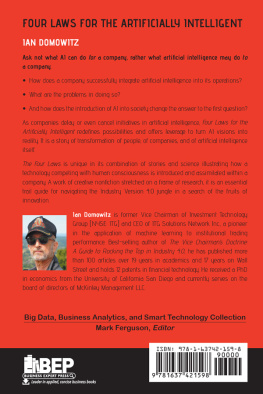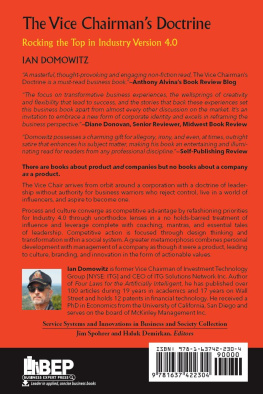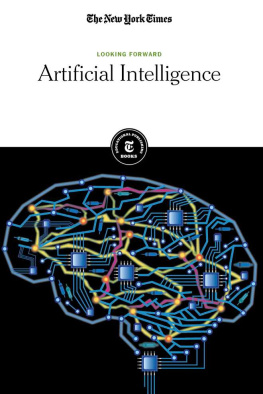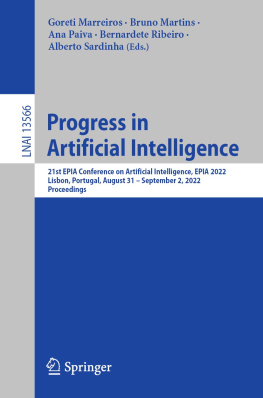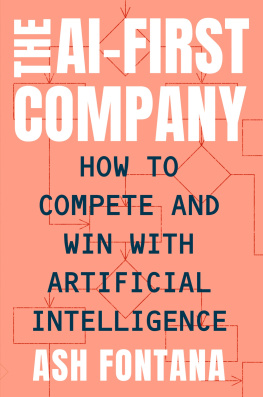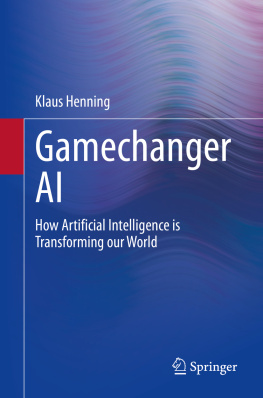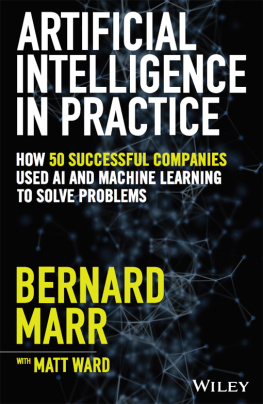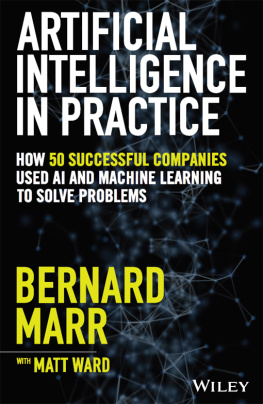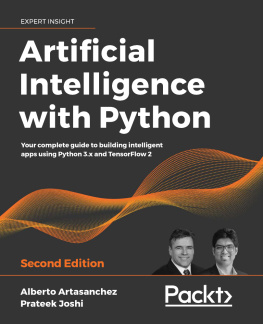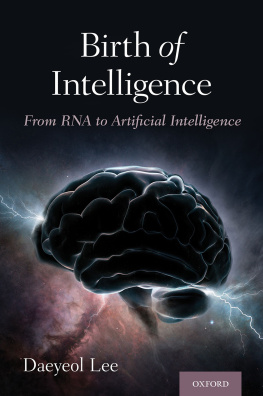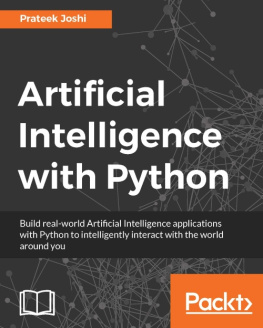Table of Contents
Guide

Four Laws for the Artificially Intelligent
Four Laws for the Artificially Intelligent
Ian Domowitz

Four Laws for the Artificially Intelligent
Copyright Business Expert Press, LLC, 2022.
Cover design by Ana Aisthesthai
Interior design by Exeter Premedia Services Private Ltd., Chennai, India
All rights reserved. No part of this publication may be reproduced, stored in a retrieval system, or transmitted in any form or by any meanselectronic, mechanical, photocopy, recording, or any other except for brief quotations, not to exceed 400 words, without the prior permission of the publisher.
First published in 2021 by
Business Expert Press, LLC
222 East 46th Street, New York, NY 10017
www.businessexpertpress.com
ISBN-13: 978-1-63742-159-8 (paperback)
ISBN-13: 978-1-63742-160-4 (e-book)
Business Expert Press Big Data, Business Analytics, and Smart Technology Collection
Collection ISSN: 2333-6749 (print)
Collection ISSN: 2333-6757 (electronic)
First edition: 2021
10 9 8 7 6 5 4 3 2 1
Description
While books are published about what AI can do for a company, there are no books about what artificial intelligence may do to a company.
Industry 4.0 is the first industrial revolution led by a technology thought capable of human consciousness and existential challenge. We are in the stage of predicting lofty accomplishments for artificial intelligence and deep fears for Earths society and structure. Beyond the trope of employee communication, no one seems to be thinking about how all this is going to work in company life. While some predict growth in AI-related investment to $100 billion a year in 2024, over 50 percent of companies are delaying and even canceling AI initiatives. Paradox.
Academician, public company Vice Chairman, and information technology CEO Ian Domowitz asks three questions. How does a company successfully integrate artificial intelligence into its operations and what are the problems in doing so? And how does the introduction of AI into society change the answer to the first question?
His thesis is this: AI is the introduction of a stream of change factors into a companys social system, which does not recognize social imperatives of company functions. The result is failure with respect to adoption. Inability to recognize AI as techne, a technology bundle capable of generating emotion, is a serious error. AI must subscribe to four functional imperatives of society, Adaptation, Goal Attainment, Integration, and Latent Pattern Maintenance. These sociological constructs are the basis of the Laws that constitute a survival guide for the practical application of artificial intelligence.
The Four Laws describes guidelines for the successful integration of AI within a firm and into our larger society, with a focus on helping organizations make AI work in the face of fear of negative public perception and emerging risks.
Four Laws for the Artificially Intelligent redefines what is possible and offers the thought leadership organizations need to turn their AI visions and strategies into reality.
Keywords
artificial intelligence; AI; machine learning; data science; business culture; technology; organizational learning; entrepreneurship; leadership; industrial revolution; sociology
Contents
Ian Domowitzs new book Four Laws for the Artificially Intelligent is a terrific read as one would expect from an author who has been successful both as an academic and as a practitioner. Artificial Intelligence or AI is an overused term, and there is a tremendous lack of understanding as to both its potential and its limitations. This book asks a different question: It is not about what AI can do for a company in terms of boosting sales, morale, etc. but rather what the extensive use of artificial intelligence may do to a company. In particular, how does a company successfully integrate artificial intelligence into its operations and what are the problems in doing so? The book also touches on the bigger societal question of the broad use of AI and what this means in the human context. I thoroughly enjoyed the unique perspective Four Laws brings to the table. It is essential reading for those interested in the impact of a new and innovative technology.Ananth Madhavan, Global Head of Research for ETFs and Index Investment, BlackRock, Inc.
Dr. Domowitz lays out a masterful piece on Artificial General Intelligence (AGI); and is just the expert to do it given both his exceptional academic and practitioner knowledge and use of the tools of that concept. This is an extraordinary tale; not only only does it explain the myriad of issues facing companies (humanity) regarding AGI, but it ties it to culture and history stemming back to the days of Plato and Aristotle. Contextualizing it within the framework of the Greek term techne and addressing not just the HOW, which is normally the question people consider when thinking about AGI, but also the IF and the WHY. This book is a must for CEOs and managers seeking AGI as a solution for problems far and wide but readers must also heed Domowitzs descriptive warning that AI requires much more than a desire to use it but rather an understanding of the technical skills, risks and consequences as well as the framework upon which products and services are developed with it. This could not be a more timely or important subject; brilliant!Robert A. Gillam, Chairman and CEO, McKinley Management LLC
Man is an afterthought in Greek stories of origins.
Brothers Epimetheus and Prometheus finish the godlike chore of creating living creatures from clay. Epimetheus parcels out the gifts of nature among the animals, while men are left with nothing. With a name meaning Afterthinker, this might have been expected.
No traits are left after the animals are served. Prometheus then steals fire from the workshop of Hephaistos and gives it to mankind.
Zeus is more than a little annoyed by the theft and more so by the challenge to his power. He sentences the Titan to eternal torment and ties him to a rock. Zeus sends an eagle to eat Prometheus liver. Every day.
The choice of the liver is not random.
The liver is the source of human emotions in ancient Greek tradition. Zeus actions have little to do with logic. It will be a long time before Herakles arrives, shoots the bird, and frees the Titan. In the meantime, other retribution awaits.
Zeus punishes mankind for receiving the fire by ordering Hephaistos to create Woman. Pandora is designed to disguise true nature beneath an appealing exterior. Through her the human race would experience the ills of toil and mortality. Relative to a gods life, an existence of field labor, raw meat, household chores, extreme living conditions, and sacrifice is anathema.
What a world. Ancient Greeks loved tragedy.
Prometheus transforms into a symbol of scientific knowledge in Western tradition. He is known for teaching the risk of unintended consequences. The introduction of Olympian fire to benefit mankind introduces struggle and mortality.
Plato characterizes the flames of the gods as the fire of creative power. Creative power is techne in that tradition. The precursor to technology is associated with cultural beliefs. Plato relates creative fire to values of reverence and justice, without which a civilization cannot maintain an orderly society.

